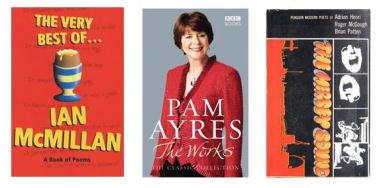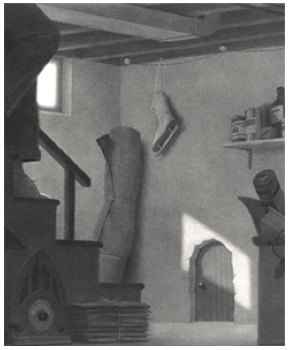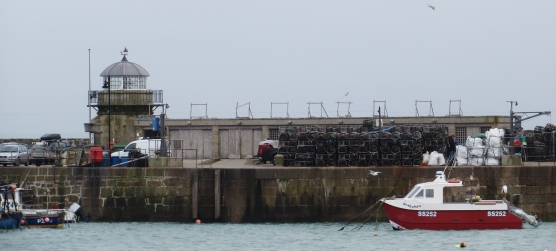§

Two things have stuck in my mind as the hook(s) I’ll hang this week’s post on.
I remember Ian McMillan saying, in a short film he made with Martin Wiley, something to the effect that ‘funny’ poetry is regarded as less important than ‘serious poetry’. When he said this I think he actually pronounced it as Serious Poetry, and I believe I knew what he meant, even though I also knew that what we mean by ‘funny’ is a lot more complicated than it might seem on the surface.
I thought of this when I saw in a Facebook post an image of faces crafted from toilet roll tubes. My first reaction was to laugh out loud. My second reaction was to see them as sinister and unsettling. They’re like the faces you might find in Breughel, or maybe in Bosch, and perhaps in some of Lautrec’s more grotesque sketches, and Boz’s illustrations for Dickens. They hover somewhere between caricature and realism. Unsettling is the word I’ll settle on.
The other thing was that for some reason I chose to take ‘funny’ poems to read on the open mic. at The Puzzle Poets Live monthly do this week. I particularly chose some of Rory Motion’s poems as well as a couple of my own. Now, it may be that you have never heard of Rory Motion, but you should. I’ve written before about how I started to do open mic poetry in folk clubs. What goes down well in folkclubs is poems that rhyme, and poems that are funny, and, preferably, poems that do both. I built up a list of ones that went down well, by people who wrote the kind of poems I still can’t write myself.
I built up a big file of stuff that wouldn’t let me down. Poets like Matt Harvey and Les Barker. I used a lot of Marriott Edgar. And I came to respect what Pam Ayres did. She’s a crafty, clever writer despite her TV persona. I’m very fond of ‘Clive the fearless birdman‘. I learned a lot from watching Ian Macmillan’s live performances in libraries and other small venues…especially when he worked with Circus of Poets. And I think Roger McGough is frequently brilliant.

But the one who I came to enjoy and respect most was Rory Motion. You can find out about him via this link. http://www.rorymotion.com/
He honed his stage skills on the stand-up comedy circuit in the late 80’s and early 90’s, being described by Time Out as a “a post-Hippie comic”, which by way of cheerful response is how he described Time Out. Finding the increasingly gladiatorial nature of the stand-up world too limiting, he decided in 1992, following a successful national tour with Frank Skinner, to move to Bwlch y Cibau, a small village in Powys.
A regular contributor to national radio, he has appeared on comedy shows, the literature panel game ‘Booked’ with Roger McGough and Miles Kington, and written and presented his own programmes on Radios 4 and 5. In 2001, Rory and fellow poet Matt Harvey created a series of programmes called ‘One Night Stanza’ which, in a victory for poetry lovers everywhere, made the coveted 6:30 Radio 4 comedy slot. In the same year Cassells published Rory’s collection of poems, ‘Neither is the Horse’. It’s still available, and remarkable value at £7.50 for a pocket-sized hardback of 125 pp of poems.
He performed at every Glastonbury Festival from 1989 up until 2008. ( He also paints landscapes, interiors and text-pieces, and in 2007 exhibited at the Peter Pears gallery in Aldeburgh, in conjunction with a reading at the Aldeburgh poetry festival).
Rory is a huge fan of the late Captain Beefheart and his Magic Band (which tells you a good deal) and in 2013 and 2014 supported them at the York Duchess. In 2015, at the Ilkley Literature festival, Rory gave an entertaining, and apparently very successful, practical tutorial on the mysteries of solving cryptic crosswords.
Why he’s not better known, I cannot fathom. But if you hunt down his flash fictions like Mid Wales (a darkly brilliant precis of Bruce Chatwin’s On the Black Hill) or Spear of destiny (which item is for sale at a carboot sale in Totnes) or poems like Mrs Donkersley’s Chutney (an extravagant rhapsody enacted on a bus between Pocklington and York) you’ll encounter a poet of real craft and imaginative engagement with the rich oddity of the world. It’s simply not possible to pigeon-hole or categorise him, but if I think of the company he might keep it would be poets like John Cooper Clark, and, particularly, Ivor Cutler (who regularly entertained, puzzled and unsettled me when I heard him on the radio…the Home Service as it was…in the late 1950s). Surreal, surprising, artful and impeccably crafted work. Funny, serious, and, yes, unsettling.
Which brings me to today’s guest, and a long-delayed post that I’ve been wanting to write for weeks, ever since I was invited to read at A poem and a pint in Ulverston, and where I heard her read two poems that simply stuck in my mind like burrs and would not let me go…..because they were funny, spare, beautifully written, and, well, unsettling.
Time to introduce Jennifer Copley who lives in Barrow-in-Furness with her cat, dog, husband and a vast quantity of Victorian furniture inherited from her grandmother. She enjoys polishing and often gets ideas for poems while rubbing up the sideboard.
You may have come across her work via Kim Moore’s The Sunday Poem but because I think she’s one of those talented poets who tend to fly under the radar, you may not know that she’s published four pamphlets including Ice (Smith Doorstop 2002) and House by the Sea (2003) and three full-length collections Unsafe Monuments (2006), Beans in Snow (Smokestack 2009) and Sisters also by Smokestack in 2013.
Sisters sprang from a photograph of two unknown girls she saw on a post-mortem website. The poems in the first half of the book imagine the lives of these two motherless girls brought up in a strict Victorian household. The second half explores the nature of sisterhood, the predicaments that siblings face, in life and in death. A new pamphlet is due shortly from Happenstance on whose website you’ll find the endorsement many of us would give several limbs for:
U.A. Fanthorpe has described [Jennifer Copley’s] work as ‘urgent, visceral, written out of a fierce commitment to truth’ and Carol Rumens finds ‘a Chagall-like, magical-realist quality to Copley’s delicate shape-shifting’.
She has been published by The Rialto, The North, Stand and PN Review, also twice in the Forward Prize Anthology. She was 2nd in the Cardiff International and 3rd in the Bridport Poetry Prizes and although she was shortlisted for the Strokestown Prize twice and flogged all the way to County Roscommon, she didn’t win any money. I’m also gratified to learn (via Google) that for the last few years her poems have been used in Poetry Unseen Revision Papers for GCSE students.
In other words, she’s a serious poet; the whole nine yards, the full monty. And she writes poems not unlike the images I started the post with, poems that make you smile, or laugh, and then quickly reassess what just happened. I’d like to say they’re edgy, but they’re more subtle than that. Frequently, they’ll be as tender, lyrical but always clear-eyed, as these images from
Ten Places Where I See My Mother
Mondays, in the kitchen, her arms all suds.
I peer through steam but she’s disappeared
…………
Later she’ll be upstairs, taking off her wet blue dress
…………..
In the dark she’s in different places:
the end of my bed, the space by the wardrobe,
……………….
Her footprints glow for ages after she’s gone.
……………
Sundays, I see her under the earth,
peacefully asleep, her mouth slightly open,
but she comes to when I start arranging flowers.
What I love about this the matter-of-fact tone, the way this mother will never die and sees nothing remarkable about it. It makes me think of the ‘normalities’ of folk-tale and the narrow boundaries between the mundane and the wonderful. Although Jennifer Copley has something to say about them, too.
They’re only fairy tales, say our mothers,
who serve us porridge that’s far too hot;
and who are they that we should trust them
when they prick their fingers, (from ‘Fairy Tales’)
I love the way she brings the reader up short in this line: ‘who are they that we should trust them’, the way it wryly and sardonically subverts my expectations of ‘our mothers’. Subversive..that’s the word; and that’s what the last line of The robin does..it subverts.
The Robin
– was dead but no one knew who’d killed him.
–Snow in the wind, said the sparrow.
–Ice in the water butt, said the wren.
–Frost on the five-barred gate, said the blackbird.
–A poisoned snail, said the thrush.
–God, said the canary who had no respect.
–Then they all turned on each other, shrieking and accusing, although
no one had liked the robin since he’d bullied the goldfinch children to death.
What makes very tiny children laugh is surprise (which may be frightening) followed by relief. Everyone who ever played ‘Boo!’ with child in a cot or a pram knows this. And Jenny Copley’s poems know this too. She herself says ‘I must tell stories. Stories about people (or animals) in improbable situations. I’m interested in how they react and how they resolve (or don’t) the things they face.’
So here we are with the two poems she sent me to share with you all, both, as it happens set in cellars of the kind you might finding Chris Van Allsberg’s wonderful book The mysteries of Harris Burdick. If you were looking for visual equivalents of the images that Jennifer Copley creates, you could do a lot worse than start there. Basement starts in a cellar in 1940, which sets up a set of expectations that’s immediately put in question by that flat but they feel safe here.
Basement
1940, but they feel safe here,
between the ping-pong table
and the bottled fruit.
Light from a tiny barred window
spills down dust-motes.
There’s a birdcage
he always knocks his head on,
a cupboard that creaks.
Today it’s hot.
They remove more clothes than usual.
Her buttons roll into mouse-holes.
His braces, hurriedly unsnapped,
fly into a corner where they stay
for fifty years.
Upstairs, pans clatter.
Where’s Lizzy? Someone shouts
but with his tongue in her ear,
Lizzy doesn’t cotton on.
Not knowing the way war will turn,
all their arrangements,
love tokens,
sweat from their bodies,
moons from their fingers,
semen,
salt,
lie in scuffs on the floor.
I like the story-teller’s ‘they’ that demands you have to find out who ‘they’ are, between the deliberately comic ping-pong table and the bottled fruit, lit dimly by what comes through a window that’s ‘barred’. Which should make you think twice. Whoever they are, they come often because ‘there’s a birdcage / he always knocks his head on’. And yes, it’s comic, until it’s unsettling. Because they take off more clothes ‘than usual’ in a fumble of snapped-off buttons and unsnapped braces. A poem of desperate love in a time of war that’s not comic at all but as serious as salt and moons and semen. I love it.

The second poem, Cellar was the one that made me sit up and take notice at Ulverston. It has that quirkiness that makes me think of Ivor Cutler, and that disingenuous matter-of-fact quality that is so unsettlingly at odds with the story.
Cellar
Here’s where we live,
buried under ground,
our hats in our hands.
We came down in 1963
to fill up the scuttle
and the door slammed shut.
The light knocked off in 1984
so we live in the dark, bowed over
like the hulls of two old boats.
You say ‘tomato’ and I say ‘tom-ate-o’.
Apart from that we get on well enough.
Our children call down the coal hole
occasionally. They almost try the door
but their hearts aren’t in it.
After all, what would they say to us,
it’s been so long since we
kept a grip on things, on them.
Understated, memorable and unnerving. I wish I could do work like that, so economically and apparently without effort. Thank you Jennifer Copley for the poems and waiting so patiently for me to write about them.

And now I’m going to check all my lists for the umpteenth time, and double-check my packing, because first thing tomorrow I’m off over to Greater Manchester to collect two poets and then we’re heading off to St Ives for a week of poetry reading and writing. There may not be a post next Sunday, but I reckon you can put up with that, and I’ll see you when I see you. Thank you for reading.





Thoughtful and entertaining post, as always, John.
LikeLike
Great poems too! My bank card always winces when your posts appear in my inbox, it just knows that poetry books will be purchased on your recommendation.
LikeLike
Thank you for this. I began reading with my eyes and half mind but the poems made my eyes focus, and commanded my full mind. It’s a wondrous thing that so few words can hold such impact.
LikeLike
Yes! Less can be much much more.
LikeLike
Thanks for the critical appreciation… it did me good….poet receives review shock!
LikeLike